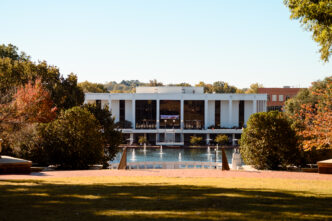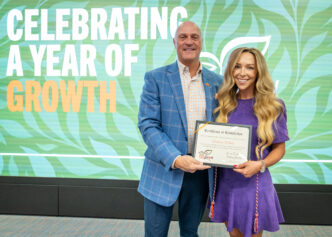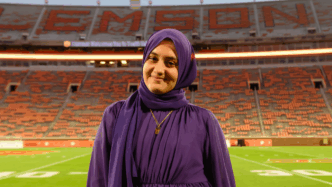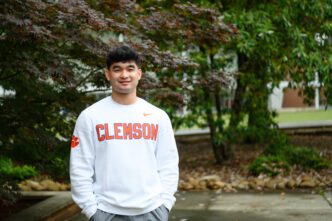James Burns is the 2024 Douglas W. Bradbury Award recipient for outstanding contributions to the Clemson University Honors College.
James Burns doesn’t just teach Honors students — he challenges them to think critically, act thoughtfully, and engage deeply with the world around them. He is also one of our students’ biggest champions, supporting their development as both scholars and people long after they graduate.
SARAH WINSLOW, DEAN OF THE CLEMSON UNIVERSITY HONORS COLLEGE AND FORMER DIRECTOR OF THE NATIONAL SCHOLARS Program
Burns started working with the Honors College shortly after arriving on campus 25 years ago as a junior faculty in the Department of History.
He remembers being approached by then Honors College Director Steve Wainscott, who asked him to imagine his dream course — and design and teach it.
“As a brand-new assistant professor, I was surprised,” said Burns. “It gave me a good, positive first impression of the Honors College as a place where faculty could be creative.”
His first Honors course focused on popular culture and imperialism. Since then, Burns has continued to teach, mentor and support Honors students in several ways.
Now the Director of the Humanities Hub on campus, Burns collaborated with the Honors College to bring several remarkable speakers to campus, including Pulitzer Prize-winning author Matthew Desmond and prison reform advocate Ray Hinton.
Burns has also reviewed Honors applications, interviewed candidates for the University’s National Scholars Program, and was part of a Task Force in 2018 focused on the future of the Honors College. However, Burns is best known among Honors students in the National Scholars Program for leading a study abroad experience in South Africa.
The program’s first trip was in 2011. Scholars spent their Spring semester with Burns studying the region’s biodiversity, policies, politics and culture. That May, they traveled together to Cape Town, South Africa, where they brought what they learned in the classroom to life through a seven-day travel experience.







The trip was so successful that Burns has brought eight other groups of National Scholars to South Africa over the past 12 years, with several program refinements along the way.
The preparation course has also changed to focus specifically on South African history and memory post-apartheid, with scholars now visiting several different parts of the country. Several cohorts have also continued their studies at Stellenbosch University for four weeks after their trip.
According to Burns, the goal was to guide the scholars through contrasting interpretations of South Africa’s past and navigate the “packaging” of history through interpretation.
“Students live in a world where history is all around them. We are awash in historical interpretation,” said Burns. “A big part of our trip preparation is to help the scholars see through the version of South Africa that the tourism industry might want them to see. I’m asking them to see the world through the eyes of those who live there.”

National Scholars Program alumna Callahan Moore Heacox took part in the South Africa trip in 2017. She said the course she took with Burns before the trip prepared her and her National Scholars cohort to engage in educated conversations with South Africans about the nation’s history.
“It is an incredible and rare accomplishment for an educator to make his discipline as indispensable to students of all academic paths as Dr. Burns has with history,” said Moore Heacox. “He encourages students to explore beyond a surface-level understanding of a subject to understand its history and its impact on the present.”Her experience inspired Moore Heacox to add a history major to her political science degree. She later wrote a dissertation on South African tourism and revisited the country with Burns, this time as a colleague, in 2022.
Caroline Hensley, who traveled to South Africa with Burns in 2014, said he is an unforgettable mentor whose encouragement, intellectual generosity, sustained care and wit can change the course of a life.
“Under his tutelage at Clemson, I gained a deep understanding of what well-designed experiential learning looks like and how ethical engagement with historical and cultural difference can and should shape our worldviews,” said Hensley. “In a seminar preparing my student cohort for a summer immersion trip to South Africa, Dr. Burns challenged us to approach complicated political landscapes with a delicate balance of humility and rigorous critical thinking.”
She also recalled more than a handful of “hilariously-timed jokes.” After providing invaluable support when Hensley returned to South Africa twice for service and study trips, Burns kept in touch following her graduation from Clemson.
Now a health humanities lecturer and career advisor at the University of Wisconsin-Madison, Hensley said she tries to emulate his balance of academic intensity with interpersonal levity in her own teaching and advising.
“I never cease to feel honored by his extensions of graceful collegiality in that, both during my time at Clemson and beyond, he has made me feel like a welcome member of an intellectual community,” said Hensley. “I hope throughout my own career, I can generate for future students the kind of spirited and enduring mentorship modeled so brilliantly for me by Dr. Burns.”
Burns will receive his award at the Honors College Distinction Ceremony on December 18.
About the Douglas W. Bradbury Award
Every year, the Honors College recognizes a faculty member who has made outstanding contributions to the college and its students. The award was made possible by a gift from the Clemson Class of 1940 and is presented during an Honors Distinction Ceremony for graduating students.
Candidates are nominated by Honors students, faculty, department chairs or other administrators. The recipient is selected by a committee with representatives from every college, who assess the nominees’ involvement in developing and teaching Honors courses, advising Honors students and college service.







